Call Us -
1800 608 088


Many people invest in residential property to build their wealth. Managing that property yourself gives you a way to maximise your return on Investment because you don’t need to pay an agent.
Managing an investment property is straightforward, especially when you have the right tools to do the job.
The most important tool is a well written residential tenancy agreement.
A residential tenancy agreement is a lease.
A “lease” is a contract where one party (the lessor or landlord) grants another party (the lessee or the tenant) the right to occupy and use a certain piece of land, in exchange for money or “rent.”
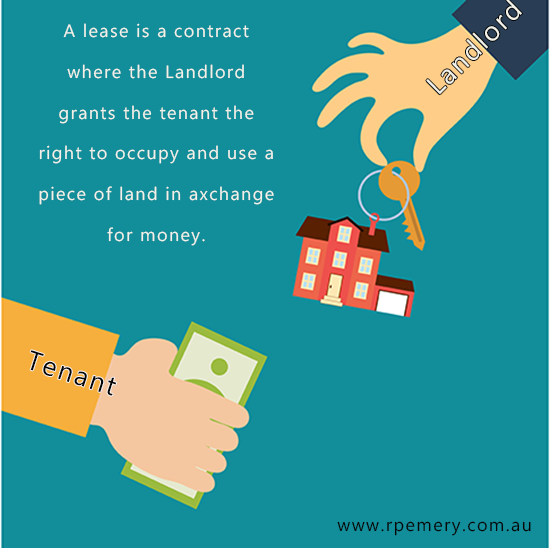
The simple act of accepting money from someone in exchange for occupying the premises on the land is said to be a verbal lease. A verbal lease is legal, binding and it automatically gives your tenant minimum rights and obligations under the law (which may not be what you want as the Landlord).
Learn: What are the three reasons why a verbal tenancy agreement can turn into a Booby Prize
There is another problem with this type of handshake arrangement – nobody knows the specifics. There are too many details left to chance.
For instance:
As you can see, many questions can arise. A verbal lease agreement leaves most of them unanswered which can be dangerous for both you and the tenant. That is precisely why experts nearly always recommend using a written commercial lease agreement.
A written lease agreement will clarify the fundamentals of the arrangement, protect the interests of both parties and minimise misunderstandings.
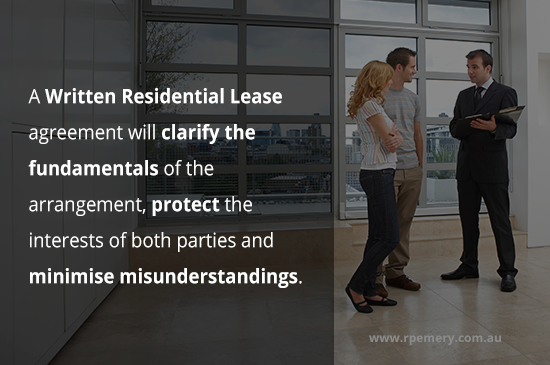
Each Australian state and territory has developed residential tenancy legislation to govern house rental transactions. These rules protect the landlords and tenants.
When you are drafting your residential lease, it is wise to use a template which complies with the state laws so you can be confident you are following the letter of the law.
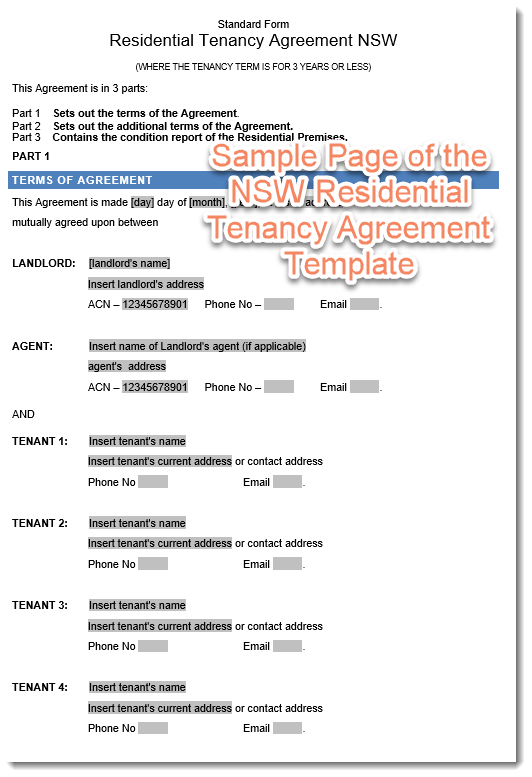
A residential tenancy or lease agreement should include all the provisions required by law to manage the tenancy. These include provisions regarding:

Our residential tenancy agreement template kit is available for each Australian State and covers all of the necessary provisions and complies with the relevant laws.
Our residential tenancy kit with easy to follow instructions gives you the tools you need to successfully manage your tenancy.
Our kit includes all these documents plus Video Instructions for completing the agreement and fulfilling your obligations as per the legislative requirements.
This residential lease will protect your investment by defining the relationship with your tenants and shielding you from potential liability.
Available for Each Australian State and our Premium Kits include all the prescribed forms you need to communicate with your tenant.
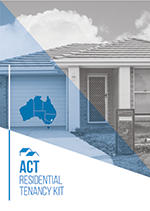 ACT Residential Tenancy Lease Agreement Template Kit
ACT Residential Tenancy Lease Agreement Template Kit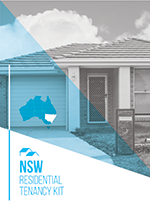 NSW Residential Tenancy Lease Agreement Template Kit
NSW Residential Tenancy Lease Agreement Template Kit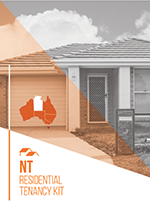 NT Residential Tenancy Lease Agreement Template Kit
NT Residential Tenancy Lease Agreement Template Kit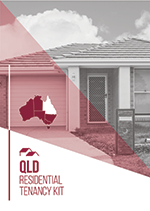 QLD Residential Tenancy Lease Agreement Template Kit
QLD Residential Tenancy Lease Agreement Template Kit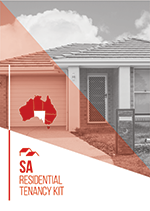 SA Residential Tenancy Lease Agreement Template Kit
SA Residential Tenancy Lease Agreement Template Kit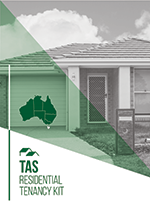 TAS Residential Tenancy Lease Agreement Template Kit
TAS Residential Tenancy Lease Agreement Template Kit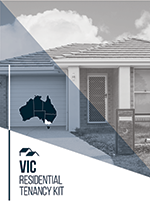 VIC Residential Tenancy Lease Agreement Template Kit
VIC Residential Tenancy Lease Agreement Template Kit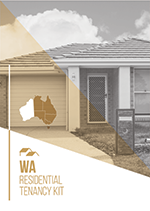 WA Residential Tenancy Lease Agreement Template Kit
WA Residential Tenancy Lease Agreement Template Kit Shared House Licence Agreement Template
Shared House Licence Agreement TemplateA Share House Licence Agreement or Lodgers Agreement may be used where an owner/occupier (or a head tenant) rents out a room, or shared area, in a premises to another.
Unlike a resident under a full tenancy agreement, Lodgers do not have the right to exclusive occupation or control of the premises. This means that the owner (or the head tenant) will be free to enter the premises at any time, thereby retaining control over the whole property.
 Storage Space Licence Template
Storage Space Licence TemplateThis document sets out the terms of the space rental, placing clear boundaries on the relationship. It ensures that each party understands their obligations and covers the essential issues like licence fees, bond amount, frequency, method of payment and so forth. See Storage space licence page for full list of provisions.
 Car Park Licence Template
Car Park Licence TemplateThis agreement sets out the rights and responsibilities of the Licensor (that’s person who grants the right use the space) and those of the licensee (the entity who will rent the space from you). You can use our car park license agreement whether you are the owner of the car park space or have the right to use the car space under another leasing arrangement.
Learn more: Renting a Car Parking Space
 When your rental property is empty it can be tempting to grab the first prospective tenant that applies but this is a rookie mistake. Bad tenants can cause you, the property owner, a great deal of emotional and financial stress. Follow these tips to recognise the tenant from hell before they move in.
When your rental property is empty it can be tempting to grab the first prospective tenant that applies but this is a rookie mistake. Bad tenants can cause you, the property owner, a great deal of emotional and financial stress. Follow these tips to recognise the tenant from hell before they move in.
 Prospective landlords often believe that trusting a property manager to oversee their investment property is the best course of action. But hiring a poor property manager can be a risky move if they turn good tenants into nightmare tenants. There are three good reasons why a poor property manager is a risk to your sanity and bottom line.
Prospective landlords often believe that trusting a property manager to oversee their investment property is the best course of action. But hiring a poor property manager can be a risky move if they turn good tenants into nightmare tenants. There are three good reasons why a poor property manager is a risk to your sanity and bottom line.
 It might seem very basic, but it is vital to get the names of the entities or “parties” correct when drafting a legal document. Stating the parties formally and accurately gives you certainty that there can be NO question about the parties’ intentions later, especially if the particulars are changed or forgotten. We look at the different types of “parties” and the correct way to record the information.
It might seem very basic, but it is vital to get the names of the entities or “parties” correct when drafting a legal document. Stating the parties formally and accurately gives you certainty that there can be NO question about the parties’ intentions later, especially if the particulars are changed or forgotten. We look at the different types of “parties” and the correct way to record the information.
 Verbal agreements can be legally binding and in fact many business and personal transactions are conducted purely on a handshake. But if things go wrong, it can be very difficult to sort the matter out or to even prove the agreement existed.
Verbal agreements can be legally binding and in fact many business and personal transactions are conducted purely on a handshake. But if things go wrong, it can be very difficult to sort the matter out or to even prove the agreement existed.
 Landlords need to follow the rules set down by legislation when communicating with tenants so they can successfully deal with issues. We outline the correct procedures that you should follow.
Landlords need to follow the rules set down by legislation when communicating with tenants so they can successfully deal with issues. We outline the correct procedures that you should follow.
 There are two options to extending a lease once the tenancy has expired – you can either enter into a new lease or document an extension of lease. Download free extension of lease.
There are two options to extending a lease once the tenancy has expired – you can either enter into a new lease or document an extension of lease. Download free extension of lease.
 Whoever said “Ignorance is bliss” was not referring to being a Landlord. Landlords need to be informed and follow the rules set down by state legislation so they can deal with issues and tenants effectively.
Whoever said “Ignorance is bliss” was not referring to being a Landlord. Landlords need to be informed and follow the rules set down by state legislation so they can deal with issues and tenants effectively.
 Methamphetamine manufacture is on the rise and poses a risk to landlords due to property damage and expensive cleaning costs. Meth labs have been found operating from homes in the suburbs, high rise apartments and increasingly, in rural locations. Do you know the tell tale signs that a property is being used as a meth lab?
Methamphetamine manufacture is on the rise and poses a risk to landlords due to property damage and expensive cleaning costs. Meth labs have been found operating from homes in the suburbs, high rise apartments and increasingly, in rural locations. Do you know the tell tale signs that a property is being used as a meth lab?
 Thinking of sprucing up your rented home over the Christmas break? Did you know that even something as simple as painting the walls requires your Landlord’s permission? Before you even start getting those colour charts out – check out the rules of what you can and can’t do to your rented house.
Thinking of sprucing up your rented home over the Christmas break? Did you know that even something as simple as painting the walls requires your Landlord’s permission? Before you even start getting those colour charts out – check out the rules of what you can and can’t do to your rented house.
 A NEW Tenancy Complaint Service launched by Fair Trading in New South Wales helps landlords, property managers and tenants resolve disputes when communication between the parties has broken down.
A NEW Tenancy Complaint Service launched by Fair Trading in New South Wales helps landlords, property managers and tenants resolve disputes when communication between the parties has broken down.
 Whilst selling an investment Property that is tenanted can be more problematic than selling an empty house, it can be done if you follow a few simple rules.
Whilst selling an investment Property that is tenanted can be more problematic than selling an empty house, it can be done if you follow a few simple rules.
 A good mortgage broker can be invaluable to your success in property investment so its pays to know how to choose the best one for your needs. We have a few tips that can help.
A good mortgage broker can be invaluable to your success in property investment so its pays to know how to choose the best one for your needs. We have a few tips that can help.
 Many couples enter into co-ownership of property as joint tenants but sometimes this arrangement is no longer appropriate and it needs to be changed. We examine the circumstances under which you may want to sever a joint tenancy. It is a straight forward process that can be done by either party without the permission of the other co-owners.
Many couples enter into co-ownership of property as joint tenants but sometimes this arrangement is no longer appropriate and it needs to be changed. We examine the circumstances under which you may want to sever a joint tenancy. It is a straight forward process that can be done by either party without the permission of the other co-owners.
 Whenever two or more parties want to buy a home, commercial property or other piece of real estate together, a written Agreement Between Tenants in Common is crucial to protecting the interests of all the parties involved.
Whenever two or more parties want to buy a home, commercial property or other piece of real estate together, a written Agreement Between Tenants in Common is crucial to protecting the interests of all the parties involved.
You may be siblings buying a house together or just friends joining forces in a Joint Venture Property Development – whatever your reasons, the importance of clear documentation that sets out the terms under which the parties record their interest, cannot be under estimated.
These Joint Tenancy Agreements set out the terms relating to the property purchase, its use, the ongoing obligations during ownership and the rights of each party should the property be sold.
They have been drafted to cover the most popular uses of jointly owned property:-
1. Jointly owned property which will be occupied by the co-owners of the property;
2. Jointly owned property where it is purchased as an investment property and will be rented to a third party;
3. Jointly owned property which will be occupied by one of the Co-owners but not the other.
Learn: Property Co-ownership – Why two or more owners are better than one.
Learn: Investing with family or friends – a match made in heaven or the fast track to hell?
Learn: What’s the difference between Tenants in Common and Joint Tenants?
 The inescapable fact is that house prices keep climbing while wages stagnate. Statistics suggest that Aussies are becoming home owners at a later age and committing to higher house debt than the generations that went before. What can you do to make the most of the resources you have and get your foot in the property ladder?
The inescapable fact is that house prices keep climbing while wages stagnate. Statistics suggest that Aussies are becoming home owners at a later age and committing to higher house debt than the generations that went before. What can you do to make the most of the resources you have and get your foot in the property ladder?
 Many property investors rely on negative gearing but what would happen if it just wasn’t available anymore. John Edwards takes a good luck at what might happen.
Many property investors rely on negative gearing but what would happen if it just wasn’t available anymore. John Edwards takes a good luck at what might happen.
 As a general rule, people make a buying decision based on emotion and the purchase of a house is no different. Buyers need a story and emotion, they need to get excited about a house or feel something. We look at design tips to reach this goal so you can sell your house faster.
As a general rule, people make a buying decision based on emotion and the purchase of a house is no different. Buyers need a story and emotion, they need to get excited about a house or feel something. We look at design tips to reach this goal so you can sell your house faster.
 No matter what age your children are, you’ll inevitably worry about their finances and future security. If your children are adults who have yet to achieve the ‘Great Australian Dream’, then you might be interested in exploring the options that will help your child invest in their own home sooner.
No matter what age your children are, you’ll inevitably worry about their finances and future security. If your children are adults who have yet to achieve the ‘Great Australian Dream’, then you might be interested in exploring the options that will help your child invest in their own home sooner.
 It’s taken several years to get all the documents together but we’ve finally done it. We’ve just launched our Property Investors Kit with a view to providing all of the documents you would need if you were prone to property investment.
It’s taken several years to get all the documents together but we’ve finally done it. We’ve just launched our Property Investors Kit with a view to providing all of the documents you would need if you were prone to property investment.
 There are some important differences between renovating an apartment and renovating a free standing property. You don’t want to upset the neighbours or fall foul of the body corporate. You can stay out of trouble by following the tips in this guide to body corporate rules.
There are some important differences between renovating an apartment and renovating a free standing property. You don’t want to upset the neighbours or fall foul of the body corporate. You can stay out of trouble by following the tips in this guide to body corporate rules.
 As a landlord, you invest time in screening suitable tenants, decide who is best placed to look after your investment property and subsequently enter into a lease agreement. However, with the rise of the sharing economy, you may be unaware of how your property is actually being used. If your tenants sub-let the property without your knowledge or permission, do you have any rights to reclaim possession?
As a landlord, you invest time in screening suitable tenants, decide who is best placed to look after your investment property and subsequently enter into a lease agreement. However, with the rise of the sharing economy, you may be unaware of how your property is actually being used. If your tenants sub-let the property without your knowledge or permission, do you have any rights to reclaim possession?
 It’s tempting to turn your spare room into a stream of extra income, and it’s pretty easy to do with tools like AirBnB. But don’t jump into this venture lightly because there are serious issues to consider.
It’s tempting to turn your spare room into a stream of extra income, and it’s pretty easy to do with tools like AirBnB. But don’t jump into this venture lightly because there are serious issues to consider.
 The announcement by the NSW government, made earlier this month, announced a raft of reforms designed to prevent investor owners from using their apartments for short term, Airbnb-style lets. But the lack of detail in the proposed reforms has left people perplexed.
The announcement by the NSW government, made earlier this month, announced a raft of reforms designed to prevent investor owners from using their apartments for short term, Airbnb-style lets. But the lack of detail in the proposed reforms has left people perplexed.
 Do you own a house in NSW that was built before 1980? If so, it may be affected by loose-fill asbestos which could mean you are unable to sell or rent your home or investment property in the future.
Do you own a house in NSW that was built before 1980? If so, it may be affected by loose-fill asbestos which could mean you are unable to sell or rent your home or investment property in the future.
 We examine the proposed changes to NSW residential tenancy laws that are designed to protect victims of domestic violence.
We examine the proposed changes to NSW residential tenancy laws that are designed to protect victims of domestic violence.